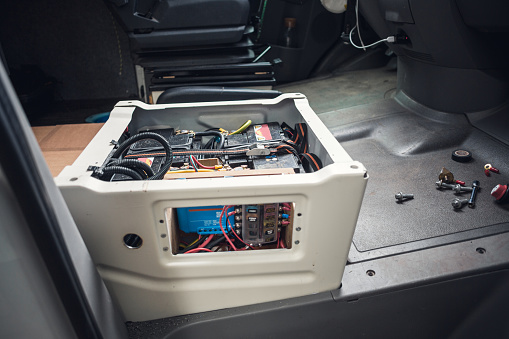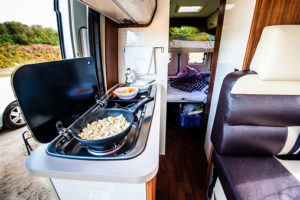How To Prepare Your RV for a Long Trip
A long RV trip is very exciting. It is a roadmap filled with adventures, experiences, and memories in the making.
As the saying goes though, it is better to travel well than arrive. However, in order to travel well – on an RV no less – extensive preparation is required. The fact is that an RV is a massive machine that will require a certain amount of attention and commitment.
In this article, we’ll talk about tips that will help you prepare your RV for a long trip.
The RV Long Trip Checklist
Plotting Your Route
Some people may think that an RV is a call to the wild; that it is a license to just hit the open road blind and see where Jesus takes the wheel. This may be effective, but more often than not, this could be a recipe for disaster.
An RV is not an island. As such, it cannot exist and sustain by itself. It needs to rely on many locations and things. These include things like gas stations, places to buy food, places to park when you sleep, and much more.
If you just head out there without a plan, then you may find yourself in an unfamiliar location. You may be lost in the roads, not knowing where to go. A fate worse though is if you miss important stops and be stranded without food, water, or gas.
The simple way to avoid these predicaments is to prepare the route of your trip. This is a step that most people know that they need to do, but often fail to do so.

Start out your trip by planning your routes via a variety of tools that you can get online. Here are a few tips for your route planning.
First, bear in mind that RV trips are best done slow and steady. Expect the pace to be slow and relaxed. Thus, when you plan where you will stop, a good rule of thumb is that they should be around 300 miles or a good four hour drive to get to.
You’ll also need to plan which campgrounds you’ll stop at, what amenities they have, where you’ll be gassing up next, and even stores that you’ll pass along the way.
Be sure to keep a set of updated maps onboard with you on your RV. This way, you can refer back to it if you are having trouble. At the same time, a good GPS setting is also a good addition. This can easily direct you through your path, but if the connection goes fuzzy, the maps will come in handy as well.
Watching the Weather
This one is closely related to planning as well. Much like the routes, you also have to plan for the weather that you’ll be facing in your upcoming trip.
Whatever your disposition is to the weather, the plain truth is that travelling with pleasant weather is downright better than travelling in awful weather. Why travel in hard rains when you can go when the sun is nice and high in the sky?
For RV users, this is also important since you’ll be mostly stopping at camping grounds. There won’t be much opportunity to enjoy the grounds if it is raining hard.
As an RV user, you need to constantly look at the weather updates for all your destinations. You need to check on the weather conditions for each of your stops. Since the weather constantly changes, take it a step at the time.
Start by checking the weather conditions for when you start your trip and for the area of your first camping ground. Once you get there, do the same for your next stop until you get to your destination.
Checking the RV Battery
The next few tips will mostly be for people who have had RVs for a while. If you have had your RV for a while and are now taking out for another trip, one of the first things you’ll need to check is the battery of the RV.
For every month that you’ve kept the RV in storage, at least 10% of its power is lost per month if you haven’t been using it. For any long trip, it is best to have your batteries at 100% power, especially for a long trip. You also need to check the water levels of your battery. If you aren’t sure about how to do this, you can check out the manual of your battery.
Some RV owners will take out the batteries when they put their RV in storage. If that is the case, make sure that it is correctly reconnected. You can also have service engineers do it for you if you aren’t confident with your own skills.

Checking Your RV’s Appliances
The next thing you’ll want to check are the appliances for your RV. Many RVs use propane for a variety of purposes in the RV. As such, you’ll need to recheck the LPG tanks themselves, the connections used, the valve, and even the firing operation.
This is vital to the RV. Thus, if something seems amiss, it is best to have it checked by a specialist or expert. You should also do a leak and gas pressure test.
If your tanks are refillable, be sure to inspect the expiry dates for each.
After the propane tanks, you’ll want to turn your attention to the various appliances within your RV. These include things like your refrigerator, microwave, air conditioner, and various other electrical appliances that you may have.
Checking Your RV’s Engine
One final thing you need to check is the engine of your RV. For obvious reasons, the engine is very important for a long trip. If it conks out on you, then your long trip may conk out on you too. It is best to ensure that the engine is in tip top shape.
For the engine, you’ll want to check the oil levels, the various other liquids are topped up, and the belts are tight and show no signs of wear and tear.
The various fluids include power steering fluid, transmission fluid, engine coolant, engine oil, and brake fluid just to name a few.
If one of these fluids is not to the normal suspected level, this may indicate a leak. Take the time to study the engine and see if there is one. You can also opt to bring in your RV for servicing so that the experts can do that for you.
Along with the engine and the various fluids, you’ll also want to double check the gauges. See if these gauges are giving you accurate reading.
Be Prepared
We hope that the checklist above will help you prepare your RV for the long trips ahead. Whether the trips are long or short, preparations must still be made to ensure a smooth RV trip that you will most certainly get to enjoy.
While preparation is key, it doesn’t mean that nothing will go wrong. As Murphy’s Law states, anything that can go wrong will go wrong. This isn’t a hex on any trips. This also doesn’t mean that life is a series of neverending miseries.
This simply means that despite our best efforts, unfortunate circumstances may come. The best thing to do is to research whatever else RV owners can expect when going on long trips. Talk to other RV owners as they may have some insights that may prove useful.
And when you come face to face with something that you aren’t prepared for, take it like the RV trip: slow and steady. Never panic and work the problem.
Stay safe on the road and enjoy the long trip.
You might also wanna check IMPORTANT THINGS THAT FIRST TIME RV OWNERS SHOULD KNOW.





